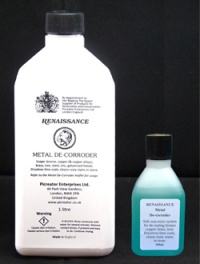Difference between revisions of "Renaissance Metal De-Corroder"
| (4 intermediate revisions by 2 users not shown) | |||
| Line 2: | Line 2: | ||
== Description == | == Description == | ||
| − | [[http://www.picreator.co.uk/ Picreator.co.uk]] Renaissance Metal De-Corroder is an amine complex of hydro-oxycarboxilic acid in an aqueous solution. It has a slight acidic pH at 4.0 | + | [[http://www.picreator.co.uk/ Picreator.co.uk]] Renaissance Metal De-Corroder is an amine complex of hydro-oxycarboxilic acid in an aqueous solution. It has a slight acidic pH at 4.0. |
It was described by the manufacturer for treatment of iron; copper; copper alloys; brass; steel; zinc; and galvanized materials with corrosion. | It was described by the manufacturer for treatment of iron; copper; copper alloys; brass; steel; zinc; and galvanized materials with corrosion. | ||
| Line 10: | Line 10: | ||
Manufacturer claims that the complex is safe for prolonged exposure and metals would be stable for up to 14 days, prior to a protective coating. | Manufacturer claims that the complex is safe for prolonged exposure and metals would be stable for up to 14 days, prior to a protective coating. | ||
| − | == | + | == Synonyms and Related Terms == |
| + | |||
| + | amine complex of hydro-oxycarboxilic acid; citric acid; | ||
| + | |||
| + | == Risks == | ||
| + | |||
| + | * The pH 4.0 suggests that proper personal protective equipment should be used for handling the acidic solution. | ||
| + | * Non-flammable; Disposable in Water; Skin irritant; Avoid in eyes; Non-hazardous | ||
| + | * Talas: [https://www.talasonline.com/Renaissance-Metal-De-Corroder MSDS] | ||
| + | |||
| + | == Physical and Chemical Properties == | ||
| + | |||
| + | * pH = 4.0 | ||
| + | * Specific Gravity = 1.05 | ||
| + | |||
| + | == Working Properties == | ||
Manufacturer suggests that De-Corroder is most effective between 10-20C. | Manufacturer suggests that De-Corroder is most effective between 10-20C. | ||
| + | ==Resources and Citations== | ||
| − | + | * Product Information: [http://www.picreator.co.uk/articles/10_renaissance_metal_de.htm Renaissance Metal De-Corroder] | |
| − | |||
| − | |||
| − | + | * Ireland, C., Skipper, L., Elie, M. 2014. Cleaning of metals contaminated with historic pesticide residues that are hazardous to health. In: Journal of the Institute of Conservation. London: Institute of Conservation. DOI: http://dx.doi.org/10.1080/19455224.2013.873725 | |
| − | + | [[Category:Materials database]] | |
Latest revision as of 08:01, 26 July 2022
Description
[Picreator.co.uk] Renaissance Metal De-Corroder is an amine complex of hydro-oxycarboxilic acid in an aqueous solution. It has a slight acidic pH at 4.0.
It was described by the manufacturer for treatment of iron; copper; copper alloys; brass; steel; zinc; and galvanized materials with corrosion.
The effect from De-Corroder was rupture bonds between a base metal and the corrosion layer that forms a sludge. This sludge can be cleared by wiping or brush, then rinsed with water.
Manufacturer claims that the complex is safe for prolonged exposure and metals would be stable for up to 14 days, prior to a protective coating.
Synonyms and Related Terms
amine complex of hydro-oxycarboxilic acid; citric acid;
Risks
- The pH 4.0 suggests that proper personal protective equipment should be used for handling the acidic solution.
- Non-flammable; Disposable in Water; Skin irritant; Avoid in eyes; Non-hazardous
- Talas: MSDS
Physical and Chemical Properties
- pH = 4.0
- Specific Gravity = 1.05
Working Properties
Manufacturer suggests that De-Corroder is most effective between 10-20C.
Resources and Citations
- Product Information: Renaissance Metal De-Corroder
- Ireland, C., Skipper, L., Elie, M. 2014. Cleaning of metals contaminated with historic pesticide residues that are hazardous to health. In: Journal of the Institute of Conservation. London: Institute of Conservation. DOI: http://dx.doi.org/10.1080/19455224.2013.873725
